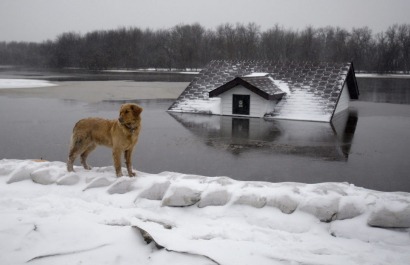
The voices of politicians denying climate change are growing ever louder, particularly in the early presidential candidate debates in the U.S. Opinions range from uncertainty about human contributions to climate change to outright denial of the scientific facts, attributed to scientists who will say anything to get the next big government grant. Most of these politicians seem to agree that government efforts to reduce climate change gases from industrial plants are inhibiting economic growth and costing jobs.
But if there is any doubt about the reality of climate change, just ask your insurance agent! Insurance companies have much at stake in the climate change debate – if coastal properties are inundated, forests burn, crops are lost, and storms become more intense, insurers stand to lose billions. The survival of this giant global industry depends on an honest assessment of climate change risks.
Practically every major insurance company in the world acknowledges climate change on their web pages, and there are initiatives among many companies to study climate change and formulate a course of action. One such initiative, ClimateWise, has a membership of 40 insurance companies and organizations in Europe, North America, and Southern Africa that have signed on to these principles:
• Lead in risk analysis
• Inform public policy making
• Support climate awareness among our customer
• Incorporate climate change into our investment strategies
• Reduce the environmental impact of our business
• Report and be accountable
Other insurance company-based efforts include the Munich Climate Insurance Initiative, the Geneva Association’s CR+I project, and the United Nations Environment Programme Finance Initiative (UNEP FI). The UNEP FI’s Principles for Sustainable Insurance will be launched at the 2012 United Nations Conference on Sustainable Development in Rio de Janeiro.
Aside from these initiatives, individual insurance companies and markets are also planning for future changes to the earth’s climate. For example, Lloyd’s is quite clear about climate change and its importance to the insurance industry: "Experts now generally agree that the climate is changing – and that human activity is playing a major role. Most worryingly, the latest science suggests that future climate change may take place quicker than previously anticipated. There will continue to be some debate over both the extent of future climate change and its likely impact on society. But whatever the facts, there could hardly be an issue of greater importance to the insurance industry."
(You can see Lloyd’s “Adapt or Bust” report on the increasing volatility of the climate by clicking here.)
Other insurance giants have taken a similar stand. According to Tokyo Marine Group, Japan’s largest non-life insurer (with offices in 39 countries):
Insurance companies are deeply affected by climate change in their core businesses. In fact, insurers in different regions and countries in the world have had to pay huge insurance claims because of damage caused by frequent occurrences of natural disasters since the 1990s. It is generally considered that climate change is a serious threat confronting the global insurance industry over the medium to long term.
The Insurance Australia Group's Environment Commitment states the Group’s recognition of “the effects of climate change on society, including the potential for disruption at both the social and economic level [and that] climate change must be addressed with appropriate urgency.”
In the U.S., the Allstate Insurance Company “recognizes that our business and our ability to continue to protect our customers may be profoundly affected by climate change.”
Acknowledging uncertainties in climate modeling, the Hartford Financial Services Group believes that such uncertainty itself is of great significance to the insurance industry, and it will become increasing important to set insurance prices taking into account the uncertainty surrounding underlying risk.
According to Hartford, “Absent this fair-market pricing, the uncertainty created by climate change may lead to a contraction in coverage.” In other words, the insurance industry needs to understand and quantify the potential risks associated with climate change, including the range of uncertainty, and set prices accordingly.
Swiss RE takes credit for identifying climate change as a major sustainability challenge 20 years ago, and the company has since sponsored a number of studies and initiatives, including helping to found the Swiss Climate Foundation.
Munich RE initiated the Munich Climate Insurance Initiative “in response to the growing realization that insurance solutions can play a role in adaptation to climate change.” Believing that insurance must be a key element of adaption strategies, the Initiative seeks to identify insurance-related mechanisms that can “dampen the negative effects of global warming and minimize the financial risks of an increasing number of natural catastrophes.” One of the Initiative’s intriguing ideas is help disaster-prone countries manage future risks with “climate insurance.”
It is easy to see what the insurance companies are thinking when it comes to climate change:
• Provide value to the customer while being responsible corporate citizens and stewards of the environment.
• Identify new business and investment opportunities while protecting assets.
• Use the science of climate change, including the range of unknowns and uncertainties, to understand underlying risk and set prices accordingly.
If the industry gets this right, it will protect its clients’ assets as well as its own investments while realizing opportunities to expand its business base. Already, it appears that insurers have learned one valuable truth, which is to not pay attention to the politicians’ anti-climate change nonsense. This industry, for one, knows that ignoring the scientific facts is never good business.
[Addendum: Click here to see an excellent report just published by the Geneva Association summarizing extreme events and insurance in 2011. Richard Crume, 12/03/12.]

